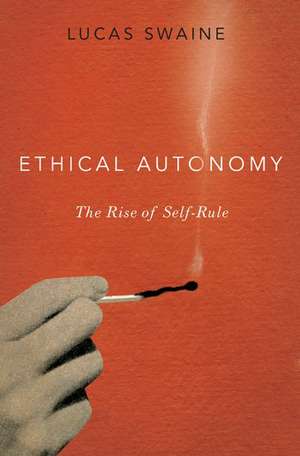Ethical Autonomy: The Rise of Self-Rule
Autor Lucas Swaineen Limba Engleză Hardback – 22 apr 2020
Preț: 455.13 lei
Preț vechi: 586.79 lei
-22% Nou
Puncte Express: 683
Preț estimativ în valută:
87.10€ • 90.38$ • 72.80£
87.10€ • 90.38$ • 72.80£
Carte disponibilă
Livrare economică 13-19 februarie
Preluare comenzi: 021 569.72.76
Specificații
ISBN-13: 9780190087647
ISBN-10: 0190087641
Pagini: 252
Dimensiuni: 241 x 157 x 25 mm
Greutate: 0.48 kg
Editura: Oxford University Press
Colecția OUP USA
Locul publicării:New York, United States
ISBN-10: 0190087641
Pagini: 252
Dimensiuni: 241 x 157 x 25 mm
Greutate: 0.48 kg
Editura: Oxford University Press
Colecția OUP USA
Locul publicării:New York, United States
Recenzii
Ethical Autonomy makes an important contribution to the ongoing discussion of the role of autonomy in society.
In this immensely important contribution to contemporary ethical theory, Swaine revisits the idea of autonomy, reworking shopworn notions of personal autonomy into an attractive and practical ideal of autonomy grounded in character and disposition. The book is beautifully written, cogent, and well-argued: at once an immensely serious work of analytic philosophy and a passionate and practical guide to practice.
Acrossmuch of contemporary moral and political theory, autonomy is takenas an uncontroversial value; at worst, it is judged to be too demanding, too high a standard to expect everyone to attain. Lucas Swaine's admirably contrarian Ethical Autonomy argues that autonomy as we have traditionally understood it is not demanding enough. He suggests that it puts contentless proceduralism where moral character should be, telling us to care less about what a person does than about whether they have fully decided it for themselves. This is a valuable challenge to received pieties, set out in a thoughtful, careful, and intellectually ambitious book.
This book is smart, well-written, and thoughtful. Swaine discusses autonomy, a central concept in liberal political thought, and offers a fuller alternative: ethical autonomy.
In this immensely important contribution to contemporary ethical theory, Swaine revisits the idea of autonomy, reworking shopworn notions of personal autonomy into an attractive and practical ideal of autonomy grounded in character and disposition. The book is beautifully written, cogent, and well-argued: at once an immensely serious work of analytic philosophy and a passionate and practical guide to practice.
Acrossmuch of contemporary moral and political theory, autonomy is takenas an uncontroversial value; at worst, it is judged to be too demanding, too high a standard to expect everyone to attain. Lucas Swaine's admirably contrarian Ethical Autonomy argues that autonomy as we have traditionally understood it is not demanding enough. He suggests that it puts contentless proceduralism where moral character should be, telling us to care less about what a person does than about whether they have fully decided it for themselves. This is a valuable challenge to received pieties, set out in a thoughtful, careful, and intellectually ambitious book.
This book is smart, well-written, and thoughtful. Swaine discusses autonomy, a central concept in liberal political thought, and offers a fuller alternative: ethical autonomy.
Notă biografică
Lucas Swaine is Associate Professor of Government at Dartmouth College. He is the author of The Liberal Conscience: Politics and Principle in a World of Religious Pluralism and of articles in a wide range of scholarly journals. He is currently pursuing research on the nature and value of freedom of thought.
